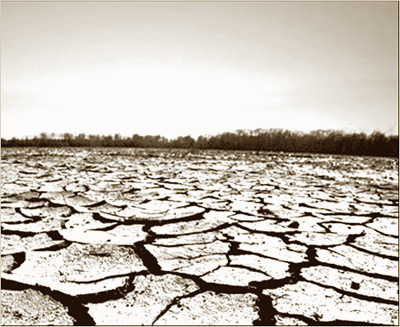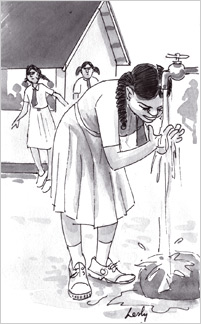Preparing for water scarcity
 Many scientists thought that global warming would make the rainfall
in humid tropical areas such as Sri Lanka even greater. Indeed, research
published in the magazine ‘Science’ in last April shows that, based on
changes to the salinity levels of the oceans in the period 1950-2000,
the world’s wet areas have got wetter. Many scientists thought that global warming would make the rainfall
in humid tropical areas such as Sri Lanka even greater. Indeed, research
published in the magazine ‘Science’ in last April shows that, based on
changes to the salinity levels of the oceans in the period 1950-2000,
the world’s wet areas have got wetter.
|

Droughts - ill effects of global warming |
However, Sri Lanka is apparently bucking the trend. Studies done by
researchers at the University of Colombo have indicated that the
rainfall pattern has changed in the past 60 years: there has been
progressively less rain in the wetter areas of the island, while there
has been an increased intensity of precipitation in shorter rainy
spells, with longer dry spells.
This year’s weather pattern certainly appears to be following this
trend, with some rainfall in Colombo but not in the vital upcountry
catchments. As global warming heats up, it is likely that the new
configuration of precipitation will deepen in effect, causing drought in
the catchment areas and floods elsewhere.
The problem is exacerbated by the depletion of forest cover,
especially in the vital upcountry sources of the major rivers. The loss
of forest cover decreases the ability of the soil to retain water and
hence rainwater pours downhill much faster, instead of running slowly to
enable a constant flow to the rivers. This, together with the change in
intensity of rainfall has led to increased occurrences of floods and
droughts.
Better conservation
Our forward planning for the rest of the century will have to take
this unpalatable fact into account. Our reliance hitherto on abundant
rainfall and gushing streams and rivers will have to be adjusted to a
more meagre supply of water. This has enormous ramifications, not merely
for supplies of potable water, but for other uses - in agriculture, in
hydroelectric power generation, in industry and in homes. There are
three principles which must be inculcated into the national psyche if we
are to be able to face shortages of water in the future: more storage,
better conservation and greater re-use. The ancient hydraulic engineers
well understood these principles, as they built irrigation tanks in
cascades downstream of one another. Indeed, ancient Sri Lankans were
imbued with far greater appreciation of the value of water than we are
today. This is well illustrated by the passage in the Culawamsa in which
King Dhatusena raises the water of the Kalaweva tank in his hands and
declares it to be his treasure, to the chagrin of his patricidal son
Kasyapa.
Ancient irrigation tanks
The water fetish of antiquity is further exemplified by the lotus
ponds of Anuradhapura and the water gardens of Sigiri. Water was thus
synonymous with pleasure and was at the same time sacred, signifying
purity and goodness. Our culture is permeated with the same principles,
but these have become ritualistic in the modern era of the abundance of
water. We must re-instil in the populace the practical aspects of our
ancient hydraulic heritage.
The best way to improve storage is to allow nature to do its work and
restore forest cover. The ancients, unlike their modern descendants,
hesitated to cut down trees - Dutugemunu is reputed to have named the
Ruwanweliseya Dagoba for the deity of the tree that he was forced to cut
down to build it.
It is necessary once more to inspire in our people the old love for
verdant nature: there should once more be many trees in each home
garden, allowing greater preservation of the water table in urban areas
as well as rural. Storage capacity can be improved by renovating the
hundreds of ancient irrigation tanks which dot the landscape. And each
household should be made harvest and store rainwater. Water can be
conserved by better irrigation techniques - such as drip irrigation for
non-paddy crops. Where tube wells are used, it is essential that the
rate of extraction is not greater than the ability of the ground-water
source to recharge itself.
 The reduction of electricity use is a means to conserve the water in
hydro-electric reservoirs, particularly in the dual-use (irrigation and
power) Mahaweli river system. The reduction of electricity use is a means to conserve the water in
hydro-electric reservoirs, particularly in the dual-use (irrigation and
power) Mahaweli river system.
Shops, offices and houses can benefit by the replacement of existing
equipment by less water-extravagant apparatus. The dual-flush cistern,
with a choice of two discharge volumes, and the knee-operated wash-basin
tap (the latter especially in canteens and communal toilets) are obvious
examples of what is required.
Re-use of water
However, the technology differential need not be all that great: the
use of a mop rather than an ‘ilapata’ to wash floors, the use of a
shower instead of a bathing bucket, and so on. The re-use of water can
best be achieved by re-using wash-water - technically called ‘grey
water’. The more modern hotels already use grey water for gardening
purposes. It can also be used (in conjunction with harvested rainwater)
to flush toilets, to wash floors and motor vehicles.
Indeed, much precious potable treated municipal water is used for
washing purposes for which such high standards of hygiene are not
required. Ideally, municipal water should consist of two separate
pipeline systems, one for potable-level treated water and the other for
grey water and harvested rainwater, for two levels of use.
Water from sewage can also be re-used, suitably purified. The British
engineers at the Ratmalana railway workshops reputedly drank the
purified water from the sewage treatment plant there to prove how clean
it was, with no adverse effects. In order for such measures to be
implemented and to be effective, there must be a groundswell of opinion
in their favour. This can only be achieved by educating the public about
the immediacy of the dire water crisis which faces us. |





